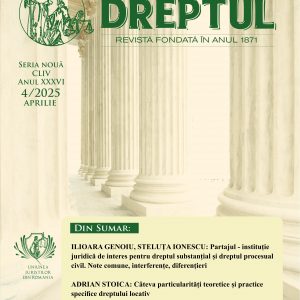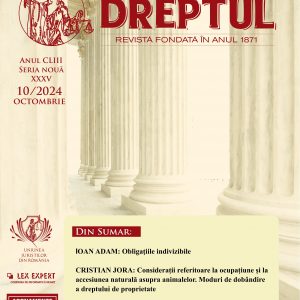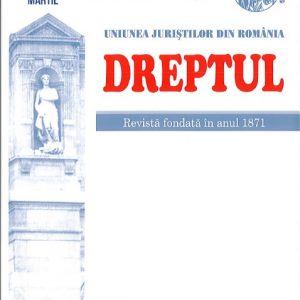-
 The article presents some reflections on the positive procedural obligation of criminal prosecution bodies to identify the successors of the victim of the offence or the injured persons who have suffered damage by ricochet (indirect victims), in order for them to exercise civil action, in the light of the new Criminal Procedure Code.
The article presents some reflections on the positive procedural obligation of criminal prosecution bodies to identify the successors of the victim of the offence or the injured persons who have suffered damage by ricochet (indirect victims), in order for them to exercise civil action, in the light of the new Criminal Procedure Code. -

-
 The paper aims to emphasize the consequences of the Judgment Costanzo pronounced by the Court of Justice in 1989 on the competences and powers of the public administration authorities, when these authorities are acting within the scope of application of the European Union law. From the perspective of the persons of private law directly concerned, the paper makes available to them the manner in which they can invoke the Union law – as a right opposable against the national administrative authorities – without requiring the intervention of the courts to obtain the removal from the application of the measures of national law contrary thereto.
The paper aims to emphasize the consequences of the Judgment Costanzo pronounced by the Court of Justice in 1989 on the competences and powers of the public administration authorities, when these authorities are acting within the scope of application of the European Union law. From the perspective of the persons of private law directly concerned, the paper makes available to them the manner in which they can invoke the Union law – as a right opposable against the national administrative authorities – without requiring the intervention of the courts to obtain the removal from the application of the measures of national law contrary thereto. -
 The obligations in solidum represent a controversial category of obligations, the controversy existing both in the Romanian and in the French doctrine. The legislator that created the current Civil Code did not outline the legal regime of the obligations in solidum, these not being mentioned among the other complex obligations. It must be noted that the obligations in solidum constitute a separate category of obligational relations with a plurality of subjects, exception from the rule of division by the operation of law of the obligations between creditors and debtors, and therefore we have considered that it is however required that, in the future, the matter of these obligational relations should be clarified by the legislator, as a legal reality in the landscape of complex obligations, which is why we will further make a theoretical analysis thereof. In this study, the defining features and legal characters of the obligations in solidum, the scope of application and the legal effects have been considered, among others.
The obligations in solidum represent a controversial category of obligations, the controversy existing both in the Romanian and in the French doctrine. The legislator that created the current Civil Code did not outline the legal regime of the obligations in solidum, these not being mentioned among the other complex obligations. It must be noted that the obligations in solidum constitute a separate category of obligational relations with a plurality of subjects, exception from the rule of division by the operation of law of the obligations between creditors and debtors, and therefore we have considered that it is however required that, in the future, the matter of these obligational relations should be clarified by the legislator, as a legal reality in the landscape of complex obligations, which is why we will further make a theoretical analysis thereof. In this study, the defining features and legal characters of the obligations in solidum, the scope of application and the legal effects have been considered, among others. -

-
 Art. 2 paragr. 1 din Convenþia (europeanã) pentru apãrarea drepturilor omului ºi a libertãþilor fundamentale (în continuare denumitã Convenþia) consacrã dreptul la viaþã al fiecãrei persoane ºi protecþia de care aceasta trebuie sã se bucure conform legii, în politica penalã a statelor membre ale Consiliului Europei. Aºadar, în privinþa dreptului la viaþã statul are nu numai o obligaþie substanþialã negativã, ci ºi o obligaþie substanþialã pozitivã; aºa cum rezultã din jurisprudenþa Curþii Europene a Drepturilor Omului (în continuare denumitã C.E.D.O.), statele nu trebuie doar sã se abþinã de a provoca moartea în mod ilegal ºi intenþionat, dar trebuie sã ia ºi mãsurile necesare pentru protecþia vieþii persoanelor aflate sub jurisdicþia lor1.
Art. 2 paragr. 1 din Convenþia (europeanã) pentru apãrarea drepturilor omului ºi a libertãþilor fundamentale (în continuare denumitã Convenþia) consacrã dreptul la viaþã al fiecãrei persoane ºi protecþia de care aceasta trebuie sã se bucure conform legii, în politica penalã a statelor membre ale Consiliului Europei. Aºadar, în privinþa dreptului la viaþã statul are nu numai o obligaþie substanþialã negativã, ci ºi o obligaþie substanþialã pozitivã; aºa cum rezultã din jurisprudenþa Curþii Europene a Drepturilor Omului (în continuare denumitã C.E.D.O.), statele nu trebuie doar sã se abþinã de a provoca moartea în mod ilegal ºi intenþionat, dar trebuie sã ia ºi mãsurile necesare pentru protecþia vieþii persoanelor aflate sub jurisdicþia lor1. -
 Starting from two recent decisions of the Constitutional Court of Romania, according to which the constitutional contentious court ruled that both the grounds and the purview of its decisions are generally mandatory, the authors of the study perform an examination of the case law of this Court, meant to support the stated rule. Based on numerous examples from the Constitutional Court case law, the importance of the grounds of decisions made by the court is emphasized, in particular when in such grounds the Court mentions the consequences of ascertaining the non-constitutionality of the texts under review. The conclusion of the study is that, in essence, the observance of the general mandatory character of the decisions of the Constitutional Court is not only a way to make its purview more efficient, but also to make the grounds more efficient, or the Court’s interpretation of the fundamental law. At the same time, an opinion is expressed that, in order to guarantee the Constitution, the intervention of the Constitutional Court is not only legitimate, but also necessary, in what regards the provision, in the contents of the grounds of decisions, considering the specific effect of constitutional law attached to any of the decisions of the Constitutional Court, of what the effects are of finding the texts under review constitutional or even non-constitutional.
Starting from two recent decisions of the Constitutional Court of Romania, according to which the constitutional contentious court ruled that both the grounds and the purview of its decisions are generally mandatory, the authors of the study perform an examination of the case law of this Court, meant to support the stated rule. Based on numerous examples from the Constitutional Court case law, the importance of the grounds of decisions made by the court is emphasized, in particular when in such grounds the Court mentions the consequences of ascertaining the non-constitutionality of the texts under review. The conclusion of the study is that, in essence, the observance of the general mandatory character of the decisions of the Constitutional Court is not only a way to make its purview more efficient, but also to make the grounds more efficient, or the Court’s interpretation of the fundamental law. At the same time, an opinion is expressed that, in order to guarantee the Constitution, the intervention of the Constitutional Court is not only legitimate, but also necessary, in what regards the provision, in the contents of the grounds of decisions, considering the specific effect of constitutional law attached to any of the decisions of the Constitutional Court, of what the effects are of finding the texts under review constitutional or even non-constitutional. -
 In this case study, the authors analyze a less common situation in the judicial practice, namely the one of the confirmation of the judicial administrator, in so far as the judicial control court admits the appeal of the creditor that had requested by means of an application for summons the appointment of another insolvency practitioner. The institution of judicial control finds its legal basis in Article 129 of the Basic Law, according to which against the judgments, the parties concerned and the Public Ministry may exercise the legal remedies, under the terms of the law. The provisions of Article 501 of the new Civil Procedure Code give efficiency to the above-indicated constitutional text, given that, without the binding nature of the judgments pronounced by the judicial control court, the purpose of control and, finally, the well-grounded and legal settlement of the cases would not be achieved.
In this case study, the authors analyze a less common situation in the judicial practice, namely the one of the confirmation of the judicial administrator, in so far as the judicial control court admits the appeal of the creditor that had requested by means of an application for summons the appointment of another insolvency practitioner. The institution of judicial control finds its legal basis in Article 129 of the Basic Law, according to which against the judgments, the parties concerned and the Public Ministry may exercise the legal remedies, under the terms of the law. The provisions of Article 501 of the new Civil Procedure Code give efficiency to the above-indicated constitutional text, given that, without the binding nature of the judgments pronounced by the judicial control court, the purpose of control and, finally, the well-grounded and legal settlement of the cases would not be achieved. -
 By Law no. 221/2009 on political convictions and the administrative measures related to them, pronounced during 6 March 1945 – 22 December 1989. This law provides for two categories of political convictions (during the mentioned period), namely two categories of administrative measures of a political nature, namely: the first category (by right), when the political nature of the criminal conviction (administrative measures) results from certain legal texts, explicitly indicated by Law no. 221/2009; the second category, when the political nature of the criminal conviction (administrative measures) can be established – at the request of the interested party –, at present, by the civil court. At the same time, either in the case of the first category, or in the case of the second category, the person in question, the husband/wife or the descendants (up to the 2nd degree) may request ordering the Romanian State to pay moral damages. According to the texts of Law no. 221/2009, the prosecutor’s participation is mandatory only in case the establishment by the civil court of the political nature of the criminal conviction or of the administrative measure is previously discussed.
By Law no. 221/2009 on political convictions and the administrative measures related to them, pronounced during 6 March 1945 – 22 December 1989. This law provides for two categories of political convictions (during the mentioned period), namely two categories of administrative measures of a political nature, namely: the first category (by right), when the political nature of the criminal conviction (administrative measures) results from certain legal texts, explicitly indicated by Law no. 221/2009; the second category, when the political nature of the criminal conviction (administrative measures) can be established – at the request of the interested party –, at present, by the civil court. At the same time, either in the case of the first category, or in the case of the second category, the person in question, the husband/wife or the descendants (up to the 2nd degree) may request ordering the Romanian State to pay moral damages. According to the texts of Law no. 221/2009, the prosecutor’s participation is mandatory only in case the establishment by the civil court of the political nature of the criminal conviction or of the administrative measure is previously discussed. -
 Recunoașterea calității de cetățean român, acordată Românilor de origine supuși unui Stat străin, confirmând o calitate preexistentă, are efect retroactiv în deosebire de naturalizare, care nu conferă străinilor această calitate decât din momentul împământenirei lor.
Recunoașterea calității de cetățean român, acordată Românilor de origine supuși unui Stat străin, confirmând o calitate preexistentă, are efect retroactiv în deosebire de naturalizare, care nu conferă străinilor această calitate decât din momentul împământenirei lor. -
 In the study hereby, the author reviews provisions of the new Romanian Civil Code (enacted by Parliament, published in the „Official Gazette of Romania”, Part I, in July 2009, but still unenforced) on the artificial property accession, by reference to the current Civil Code (since 1865), still in force, and to the relevant Romanian jurisprudence and doctrine. Conclusion of the analysis is that, on the one hand, the new Romanian Civil Code in the matter of artificial property accession keeps the rules and principles enshrined in the current Civil Code, doctrine and jurisprudence, though it reveals the innovating desire of the new Code, where the current Code keeps silent.
In the study hereby, the author reviews provisions of the new Romanian Civil Code (enacted by Parliament, published in the „Official Gazette of Romania”, Part I, in July 2009, but still unenforced) on the artificial property accession, by reference to the current Civil Code (since 1865), still in force, and to the relevant Romanian jurisprudence and doctrine. Conclusion of the analysis is that, on the one hand, the new Romanian Civil Code in the matter of artificial property accession keeps the rules and principles enshrined in the current Civil Code, doctrine and jurisprudence, though it reveals the innovating desire of the new Code, where the current Code keeps silent. -
 In this study it is examined how the patrimonial allocation estates are formed and their legal status only for those persons practicing authorised liberal professions individually, that is only for a certain category of professionals. The author has analyzed the consequences which the inclusion of a joint asset of the spouses, subject to the matrimonial regime of the legal community, into the patrimonial estate of professional allocation of one of these may have. Such a change of destination of the joint asset, even temporary, requires the consent of both spouses, and, in case of buildings, the declaration of patrimonial allocation must comply with the authentic form and must be registered in the land register in order to be opposed to the personal or professional creditors of the spouses. The specialized and exclusive guarantee of the professional creditors on the patrimonial estate of professional allocation can make possible the pursuit by these of the joint asset, so that the consent of one of the spouses to the inclusion of the joint asset in the professional allocation estate of the other spouse may be interpreted as an implicit guarantee of the performance of the professional obligations by the professional spouse who practices an authorized liberal profession.
In this study it is examined how the patrimonial allocation estates are formed and their legal status only for those persons practicing authorised liberal professions individually, that is only for a certain category of professionals. The author has analyzed the consequences which the inclusion of a joint asset of the spouses, subject to the matrimonial regime of the legal community, into the patrimonial estate of professional allocation of one of these may have. Such a change of destination of the joint asset, even temporary, requires the consent of both spouses, and, in case of buildings, the declaration of patrimonial allocation must comply with the authentic form and must be registered in the land register in order to be opposed to the personal or professional creditors of the spouses. The specialized and exclusive guarantee of the professional creditors on the patrimonial estate of professional allocation can make possible the pursuit by these of the joint asset, so that the consent of one of the spouses to the inclusion of the joint asset in the professional allocation estate of the other spouse may be interpreted as an implicit guarantee of the performance of the professional obligations by the professional spouse who practices an authorized liberal profession.
